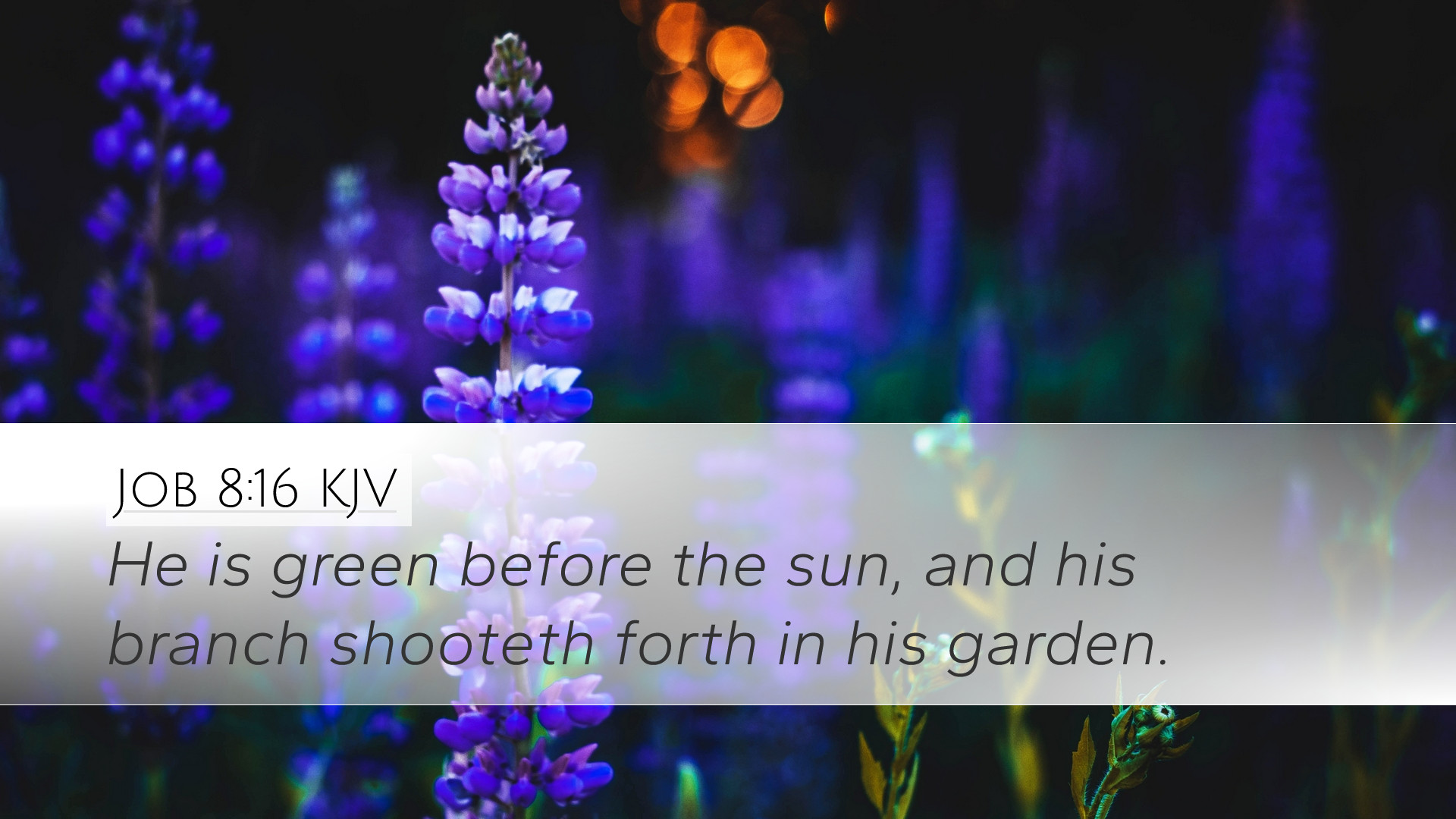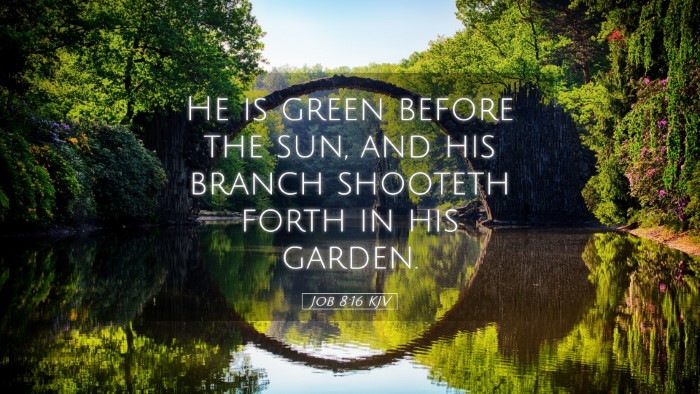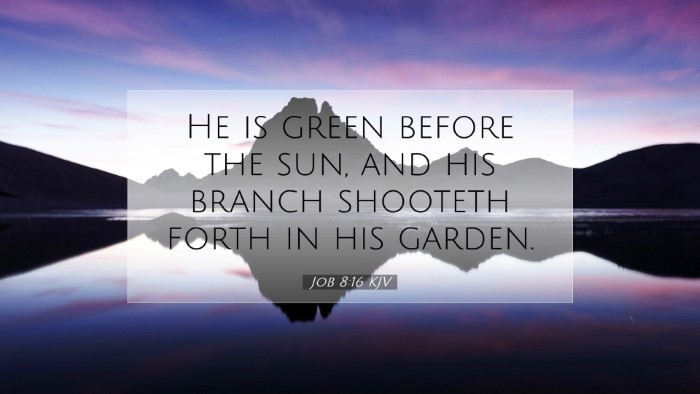Old Testament
Genesis Exodus Leviticus Numbers Deuteronomy Joshua Judges Ruth 1 Samuel 2 Samuel 1 Kings 2 Kings 1 Chronicles 2 Chronicles Ezra Nehemiah Esther Job Psalms Proverbs Ecclesiastes Song of Solomon Isaiah Jeremiah Lamentations Ezekiel Daniel Hosea Joel Amos Obadiah Jonah Micah Nahum Habakkuk Zephaniah Haggai Zechariah MalachiJob 8:16
Job 8:16 KJV
He is green before the sun, and his branch shooteth forth in his garden.
Job 8:16 Bible Commentary
Commentary on Job 8:16
Job 8:16 states: "He is green before the sun, and his branch shooteth forth in his garden."
Introduction
This verse is part of the discourse of Bildad the Shuhite, one of Job’s friends, who attempts to respond to Job's despair. The imagery employed in this passage is profound and serves multiple theological and literary purposes. Throughout the book of Job, the themes of suffering, divine justice, and the human condition are explored in depth.
Thematic Elements
In this commentary, we will explore various elements presented in Job 8:16, drawing on insights from public domain commentaries such as those by Matthew Henry, Albert Barnes, and Adam Clarke.
The Image of Vitality
The phrase "He is green before the sun" suggests vitality and life, pointing to the flourishing of a righteous person who abides in God's favor. Henry argues that this metaphor indicates the initial stages of prosperity, emphasizing how the "green" signifies immediate beauty and success yet presages the eventual contrast of withering when misfortune strikes.
Spiritual Implications
Albert Barnes links this imagery to the idea of a believer's state in the eyes of God. In His presence, the faithful exhibit vigor and prosperity. However, this image requires warning; it can easily lead to the conclusion that visible prosperity is synonymous with divine approval, a notion that can mislead those who suffer unjustly, as Job did.
The Temporary Nature of Prosperity
The final part of the verse, "his branch shooteth forth in his garden," can be explored through the lens of sustainability and the seasons of life. Clarke reminds us of the temporal nature of life’s prosperity, akin to a garden's reliance on good weather. Just as gardens rise and fall with the seasons, so too does the fate of human beings fluctuate, sometimes rooted in divine providence, and other times in human affliction.
Contrast with Adversity
Importantly, the overarching theme of the entire book of Job juxtaposes prosperity with pain. This verse serves to illustrate the fleeting state of apparent success. Matthew Henry elucidates this theme by proposing that the happiness of life can often come under trial. While the "green" may suggest abundance, the context of Job's suffering casts a long shadow on this imagery.
The Nature of True Righteousness
Bildad’s argument that those who are upright shall prosper under God’s blessing does not fully hold in Job’s experience, where the righteous suffer. This tension highlights an important discussion on the character of God and the nature of righteousness.
The Logic of Retribution
The assumption inherent in Bildad's statement speaks to the retributive theology prevalent in ancient thought, as noted by Barnes. They believed that God rewards good and punishes evil, but Job's state contradicts this notion. This paradox provides profound food for thought concerning suffering and divine justice.
Biblical Context and Literary Functions
This verse can also be contextualized within its broader literary framework. Job 8 comes during a time when Job is experiencing profound loss and anguish, which calls into question the nature of God and the justice of His governance over the world.
Dialogue Dynamics
The dialogues between Job and his friends illustrate various theological stances, notably the contrasting understanding of divine justice. Job's friends represent the traditional views on righteousness and retribution, while Job's condition urges a more nuanced exploration of suffering.
Imagery and Metaphor
The imagery employed here serves not merely as poetic decoration but carries with it ethical and existential weight. The “green” metaphor is a vivid reminder of health, beauty, and abundance, yet it also foreshadows the inevitable decline and decay—the reality of every human experience. As Clarke ponders, what does it mean for one to thrive before God when faced with undeniable loss?
Theological Insights
Theologically, this verse challenges the faithful to reconcile their understanding of God’s providence with their lived experiences of suffering. Henry warns against equating outward signs of success with divine favor, suggesting a deepening of faith during times of trial as a marker of true righteousness.
The Call for Reflection
This passage provokes a call for reflection. For pastors and theologians, there lies an imperative to teach that prosperity is not the sole indicator of a life right with God. In fact, the orthodoxy surrounding suffering and well-being calls for both pastoral sensitivity and a reexamination of doctrinal tenets within church teachings.
Conclusion
In conclusion, Job 8:16 serves as a critical theological text that invites readers into a deeper contemplation of the nature of righteousness, the realities of suffering, and the character of divine justice. The imagery of vitality amidst the backdrop of Job’s anguish becomes a powerful reminder that life’s circumstances do not always reflect God's favor, and that true understanding of His will encompasses the full spectrum of human experience.
As we reflect on this passage, let us not only appreciate the beauty of the poetry but also engage with the challenge it presents to our faith and understanding of God’s ways in our lives.


